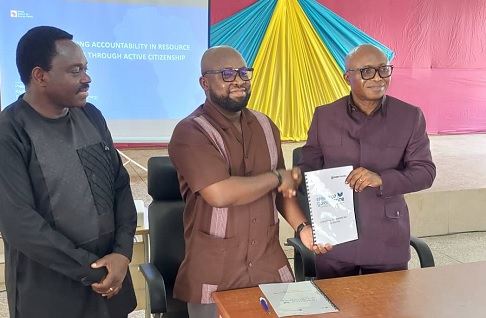The Vice-Chancellor of the University of Energy and Natural Resources (UENR), Prof. Elvis Asare-Bediako, has emphasised the need for the country to prioritise sustainable natural resource extraction and management.
He explained that effective management of the natural resources would promote sustainability and economic growth and protect the country's environment.
At the launch of the Resource Governance Campus Hub in Sunyani, last Wednesday, the UENR Vice-Chancellor said resources were meant for the development of the country and the use for other ventures of growth and sustainability.
“This has not been the story of Ghana in the last few decades, not least in the case of our oil, gold and other mineral resources.
“Let us work together to ensure that our natural resources are effectively managed to the profit of all Ghanaians, now and for the generations to come,” he said.
Campus Hub
The Campus Hub, which is the first of its kind in the country, was inaugurated, in partnership with UENR and the Africa Centre for Energy Policy (ACEP), to serve as a dynamic platform for intellectual engagement, research, advocacy and collaborative action.
It is expected to provide students with a platform to delve into the intricacies of resource policy, engage with industry experts, and contribute to solving the challenges facing the country.
Additionally, the hub will empower the students with the knowledge, skills and ethical framework necessary to navigate the complex landscape of resource governance.
Economic loss
Prof. Asare-Bediako explained that illegal mining, popularly known as “galamsey”, could lead to great economic loss.
He said the economic cost of water pollution, damaged forestry and extinction of rare plant and animal species were some of the few negative costs associated with the galamsey activities.
The Vice-Chancellor further said the country had the mandate, the education and the knowledge to ensure the resources were used for the benefit of the nation and future generations.
He said Ghana, like many African countries, was blessed with abundant natural resources but had not been able to ensure effective and equitable management to serve as catalysts for sustainable development, stating that the situation had resulted in conflict or environmental degradation, “a problem prevalent in many nations across Africa.
And where there is no conflict, the resources are seldom used for the benefit of the people”.
Resource management
Prof. Asare-Bediako said the launch of the hub marked a pivotal step in their collective journey towards fostering a generation of leaders who were not only technically proficient but also deeply committed to the principles of sustainable resource management.
He stated that the university trained students in all the major resources in the country both renewable and non-renewable, as well as programmes in Agriculture, Forestry and Mining.
Describing the Campus Hub as directly aligned with several key Sustainable Development Goals (SDGs) such as SDGs seven, eight, nine, 12, 13, 15, 16 and 17, he urged the students to engage actively in the hub’s activities, contribute their ideas, and become champions for sustainable resource governance.
Develop proposals
A patron of the Campus Hub, Dr Yaw Boakye, urged the students to always consider interesting issues on natural resources, discuss and develop them into policies or proposals for implementation.
He said ACEP and UENR would organise a series of workshops and seminars to improve their engagement skills.
Dr Boakye said the hub was meant to equip them to ask the leadership of the country and institutions the right questions about the usage of the country's natural resources.
He challenged the leadership of the students to work hard to make the hub vibrant and effective.
The Policy Lead, Petroleum and Conventional Energy at the ACEP, Kodzo Yaotse, said ACEP had planned to launch similar hubs in other universities across the country.
He said the initiative was to empower young people to make contributions and demand accountability on how the resources were utilised.
Writer’s email: biiya.ali@graphic.com.gh

